Number 15
HIMALAYAS PLUS
JULY-AUGUST 2025
Dear All,
Greetings from the Centre of Excellence for Himalayan Studies (CHS), Shiv Nadar Institution of Eminence (SNIoE). We are pleased to present the 15th edition of our Newsletter, covering the months of July and August 2025. HIMALAYAS PLUS’ previous editions can be accessed on our website.
Publications
A large and diverse set of research contributions was published during this period.
CHS Director, Dr. Jabin T. Jacob, and Dr. Constantino Xavier, Fellow, Centre for Social and Economic Progress (CSEP) co-edited the report, How China Engages South Asia: In the Open and Behind the Scenes, published by CSEP. The report, comprising twelve chapters-cum-case studies by South Asian scholars, explores China’s varied forms of multi-sectoral engagement in the region. Two of these chapters were authored by CHS faculty - Dr. Anand P. Krishnan, Fellow, analysed the growing influence of Chinese capital in India’s electronics sector while Dr. Devendra Kumar, Associate Fellow, examined Chinese influence operations within the Tibetan diaspora in India and Nepal.
Our Post-Doctoral Fellow, Dr. Rinan Shah published an Issue Brief on the legal and institutional frameworks governing springs in India, alongside a Commentary on the water provisioning systems of urban mountain towns.

In two Issue Briefs, another of our Post-Doctoral Fellows, Dr. Padma Ladon explored the changing balance between tourism and agriculture in Ladakh, and with Phuntsog Dolma - Flock Supervisor, District Sheep Husbandry Department, Leh – analysed the ecological consequences of stray dogs in the region.
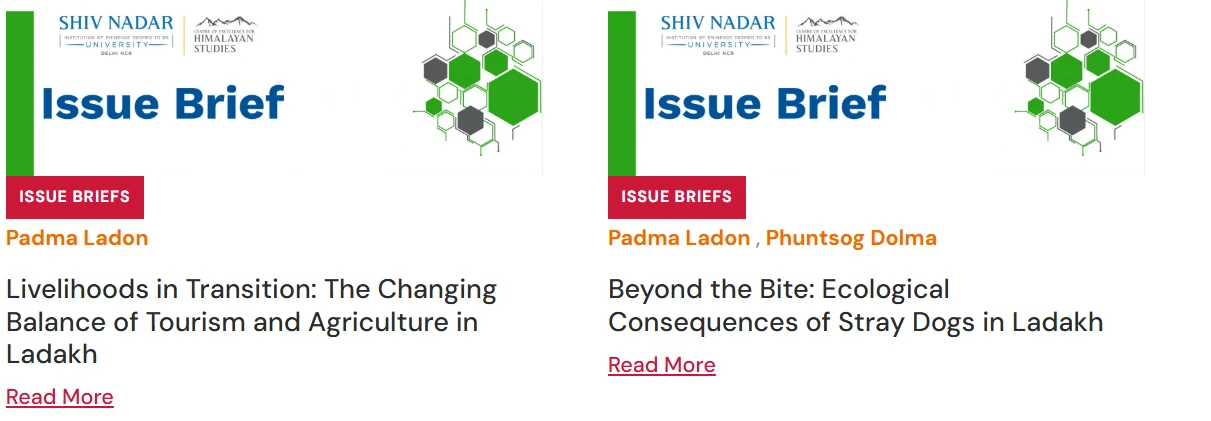
Dr. Sangay Lachenpa, CHS Post-Doctoral Fellow, examined local opposition to hydropower development in the Teesta basin. Dr. Tadu Rimi, CHS Post-Doctoral Fellow, published two Issue Briefs on the Meyor community of Arunachal Pradesh — one, traced its war-time memories and another explored their identity struggles in a militarised borderland.
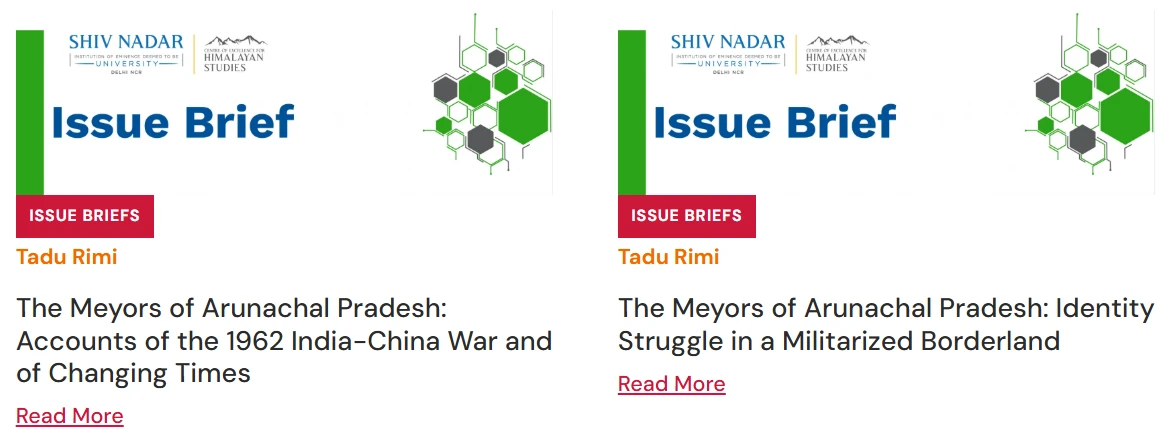
Mr. Aymeric Vo Quang, doctoral scholar, INALCO, Paris, explored Bhutan’s strategies as a small state in navigating major power rivalries. In an Occasional Paper, Ms. Alaknanda Mahajan, Ph.D. scholar, University of Jammu, examined the travels and diplomatic legacy of Mohan Lal Kashmiri, who served the Britain Empire in the Great Game against Russia.
The Centre’s translation initiative proceeded apace with the objective of making our publications more accessible to a wider cross-section of readers. We have expanded our basket of languages with the addition of Tamil. Our first translation in Tamil focuses on recent controversies surrounding the Mahabodhi temple in Gaya, and how it could impact India’s Buddhist diplomacy.
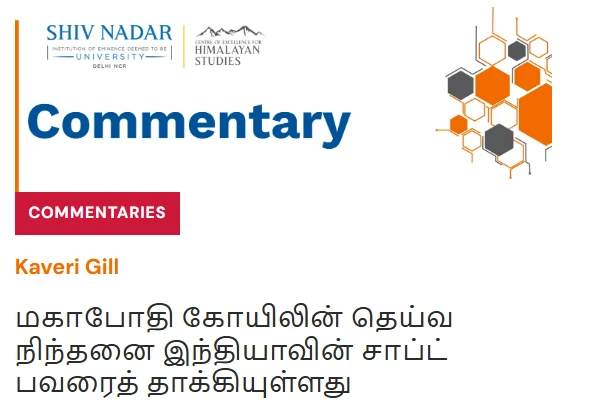
An opinion piece by Dr. Jabin T. Jacob and Dr. Devendra Kumar on the need for a rethink on India’s Tibet policy was translated into Tibetan, Urdu and Nepali, while CHS Distinguished Fellow, Mr. Claude Arpi’s analysis on Tibet’s uncertain future in the aftermath of the Dalai Lama’s announcement on his 90th birthday was translated into Urdu and Chinese.
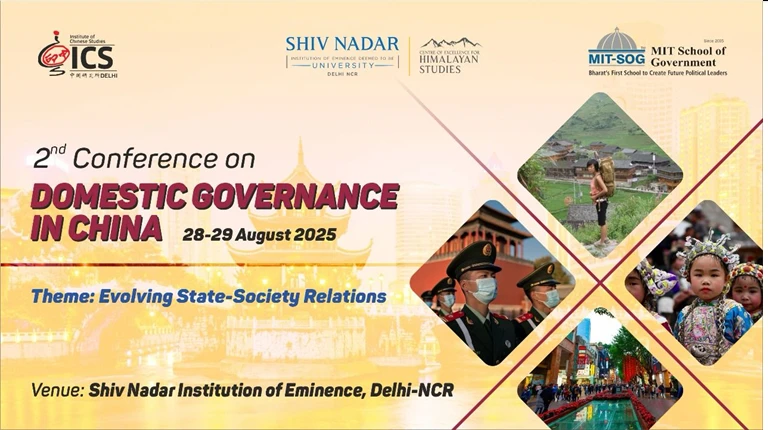
Events
On 28 and 29 August, CHS co-organised the 2nd Conference on Domestic Governance in China in partnership with the Institute of Chinese Studies, New Delhi, and the School of Government, MIT World Peace University, Pune. It explored how the Chinese Communist Party-state negotiates power, reforms, and innovation, shaping governance at home while projecting influence globally. Dr. Anand P. Krishnan and Dr. Bhim B. Subba, Assistant Professor, Department of Political Science, University of Hyderabad, were the Convenors of the conference. Dr. Krishnan also presented a paper on the discourse and role of All-China Federation of Trade Unions in the New Era under Xi Jinping. Dr. Devendra Kumar made a presentation examining the role of leadership shifts in China’s Tibet Policy in the 1990s.
During the same period, CHS Post-Doctoral Fellow, Dr. Rinan Shah, and Mr Tejas Harad, PhD scholar at the University of Pennsylvania, co-organised an online workshop on the topic of ‘Research Mentorship’, aimed to provide a platform for students from Himalayan and Northeastern region to build beginner-level research skills and engage with experienced scholars.
In the Media
In his regular column for India’s World magazine, Dr. Jabin T. Jacob compared Xi Jinping’s ‘great rejuvenation of the Chinese nation’ and Donald Trump’s ‘Make America Great Again’ campaigns, and argued how the Chinese version was both weightier and more consequential. In a piece for Deccan Herald he also examined how China was deepening its engagement in South Asia, through a new strategy of trilateral conferences. In another article for the same publication Dr. Jacob parsed the statements by India and China after the last round of Special Representative talks on the boundary issue and argued that there was less progress achieved than the impression of progress. Writing for The Tribune, he also analysed how India’s China policy appeared constrained by its preference to deal with the ‘familiar problem’ of Pakistan.
Dr. Jacob and Dr. Kumar also co-authored two pieces on the need for a rethink of India’s Tibet policy and plank of multilateralism for The Indian Express and Hindustan Times respectively.
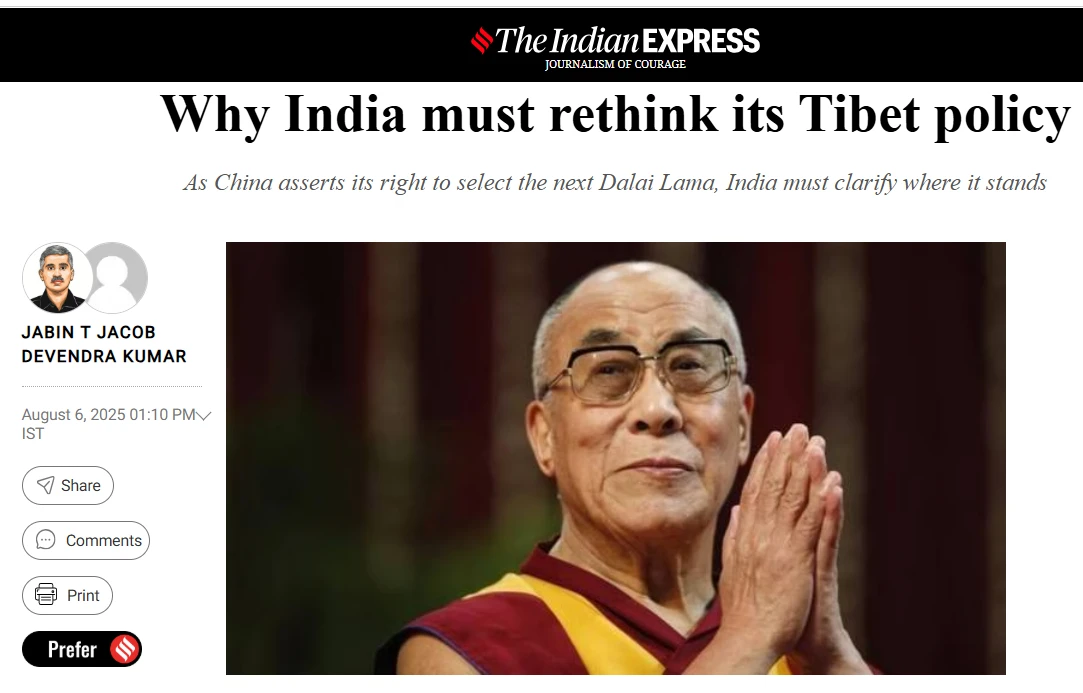
Dr. Jacob appeared on two podcasts - one on India’s handling of the Dalai Lama succession on India Today Global’s ‘Statecraft series’ and another on India’s continuing challenges with China despite the ‘normalization’ on Hindustan Times.
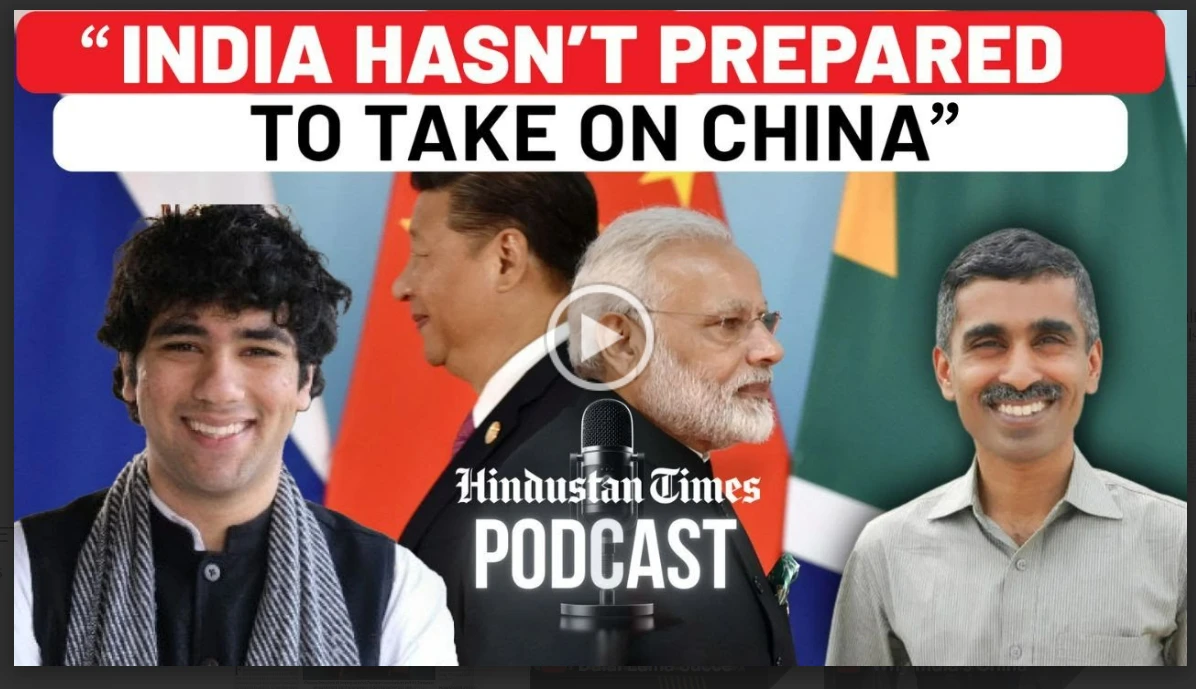
He shared his views on Xi Jinping’s anti-corruption campaign extending into China’s Central Military Commission for The Indian Express, the takeaways from Chinese foreign minister Wang Yi’s trip to Delhi, and with Dr. Constantino Xavier on their edited report on China’s Engagements in South Asia for the Business Standard.
Mr. Claude Arpi reflected on the geopolitical stakes of the Dalai Lama’s succession for the French daily, Le Monde and on the ecological risks posed by China’s dam building on Yarlung Tsangbo, for The Irrawaddy. In two pieces for Firstpost, he analyzed Xi Jinping’s visit to Tibet on the 60th anniversary of establishment of Tibetan Autonomous Region, and China’s hydropower ambitions in Tibet post inauguration of the first phase of the mega dam project over Yarlung Tsangbo. Mr. Arpi also penned a commentary for Deccan Chronicle where he examined Chinese Party-state’s policy tensions with religion and Tibet’s sacred space. He also gave an interview to Global Order on the role of the Ganden Phodrang Trust in the Dalai Lama’s succession process.
Dr. Anand P. Krishnan analyzed the economic imperatives driving the ‘normalization’ in India-China relations in the context of Prime Minister Modi’s meeting with Xi Jinping at Tianjin, in a commentary for 360info. This piece was republished in Newslaundry, Scroll, and Policy Circle. He gave his views on Prime Minister Modi’s visit to China for the SCO Summit to Asianet News (Malayalam news channel).
Dr. Devendra Kumar penned a piece for Deccan Herald on the Dalai Lama and the challenges posed by his succession for China and India.
Faculty Updates
Mr. Claude Arpi gave a talk at the Indian Army’s seminar on Indo-Tibetan linkages in Shimla. He delivered the valedictory address at the International Buddhist Confederation’s Conference in Delhi on the Dalai Lama’s 90th birthday. Mr. Arpi also gave lectures on a Tibetology course for Army officers in Arunachal Pradesh. He participated in a seminar on India’s security environment in Lucknow and visited the Kameng sector of Arunachal Pradesh, engaging with local communities and paying homage at war memorials.
Prof. Kaveri Gill, Non-Resident Senior Fellow, addressed multiple forums. She spoke on the Dalai Lama’s third commitment at the Tibet House in Delhi. She and Dr. Devendra Kumar were part of a panel discussion on the Dalai Lama’s memoirs, ‘Voice for the Voiceless’, organized by the Delhi Ghoton Organizing Committee. She also appeared on a community radio station in Himachal Pradesh, Voice of Kinnaur, where she spoke on Indo-Tibetan ties. Prof. Gill also gave a lecture at Savitri Bhai Phule University, Pune, on non-violence as a principle and strategy.
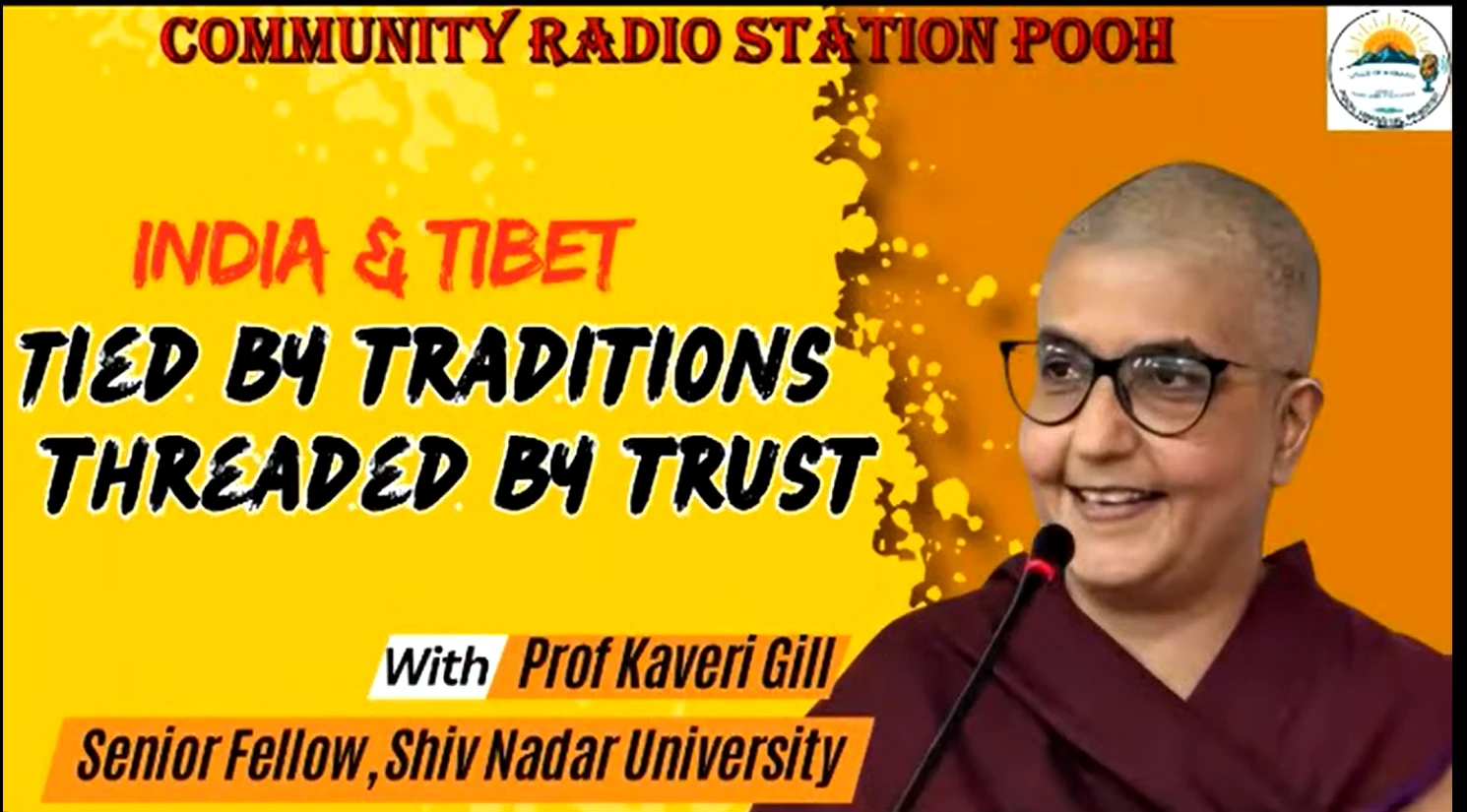
Dr. Jabin T. Jacob delivered lectures on India–China relations at Christ University, Bengaluru, Jawaharlal Nehru University, New Delhi, the College of Air Warfare, Secunderabad, and the Naval War College, Goa. He was also a panelist at a programme on China–Pakistan relations in Delhi.
Our Non-Resident Senior Fellow, Dr. Kalzang Dorjee Bhutia's article on Kinship and foodways in Sikkimese Himalayas, has been selected to be awarded the 'Honorable Mention recipient of the Most Thought-Provoking Article 2025' prize from the Native American and Indigenous Studies Association.
Dr. Padma Ladon undertook field research in Markha Valley and Rumbak, Leh, studying the impacts of tourism on traditional farming systems.
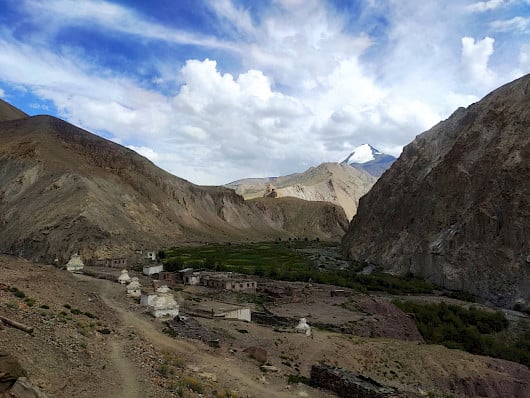
Scenic view of Hankar Village in Markha Valley
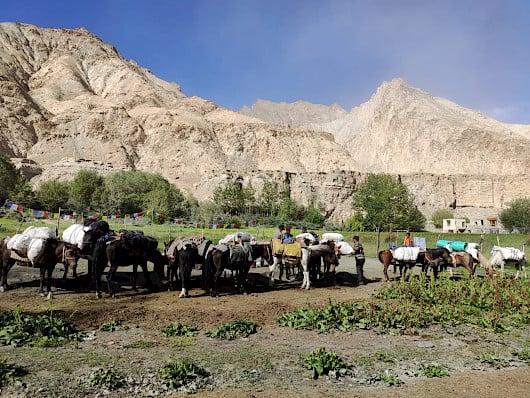
Porters with their horses preparing for the Markha Valley trek
You can stay updated with our publications, events, and activities through our website, X (@Himalayas_SNU), Facebook, and LinkedIn. You can also find previous Newsletters on our website.
Share this: